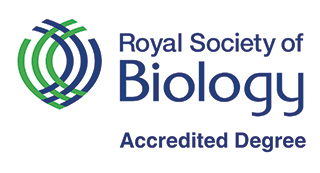BSc Biochemistry
-
UCAS code
C700 -
A level offer
ABB -
Year of entry
2027/28 See 2026/27 entry -
Course duration
Full Time: 3 years, with the option to include a placement year
-
Year of entry
2027/28 See 2026/27 entry -
Course duration
Full Time: 3 years, with the option to include a placement year
Learn about the molecular foundations of life itself with our BSc Biochemistry course.
Molecules are at the centre of all life from the smallest virus to the largest animal. Biochemists seek to understand how molecular processes control life at various levels; how do molecules make cells work, how do these cells coordinate in an organ and finally, how do these organs signal and work together for life to function? Biochemistry is at the forefront of understanding how molecules control and affect life, and an appreciation of these concepts allows biochemists to answer life’s fundamental questions and contribute to resolving critical biological problems such as designing drugs to treat cancer or even bacteria that can clean up an oil spill.
Why study Biochemistry at the University of Reading?
- Accredited by the Royal Society of Biology and you can apply for Chartered Biologist status upon graduation.
- Experience an interdisciplinary approach to biochemistry, taught by research-active experts and invited professionals.
- You will use state-of-the-art facilities during practicals and research projects.
- Excellent feedback from students: 96% of our students said teaching staff are good at explaining things (National Student Survey 2025, 95.5% of responders from BSc Biochemistry).
- Networking opportunities: The University is located in the Thames Valley corridor, giving you networking opportunities with biochemical, chemical, pharmaceutical, cell biology and informatics companies at careers fairs and events.
- Placement opportunities: Dedicated support for year-long and summer placement opportunities, including ringed-fenced positions at internationally renowned companies and organisations.
Research, Placements and internships
All our students will undertake a Research Project during their final year either in one of our research laboratories or as a data-based projects for students to gain experience in analysing large biochemical and biomedical datasets. You also have the opportunity to carry out a year-long industrial placement between your second and final year.
You also have the opportunity to undertake an internship as part of the Reading Internship Scheme (RIS). RIS offers a wide variety of internships across a multitude of sectors, including research internships on campus or with external organisations. Internships run flexibly throughout the year – both part-time during the semester and full-time during the summer vacation.
We have secured ring-fenced industrial and summer placements to several prestigious providers such as Diamond Light Source (the UK’s national synchrotron), Public Health England, GSK, AstraZeneca and Covance. You can also choose to spend a year abroad.
Our Department has a dedicated member of staff in charge of placements, who can provide you with advice and support.
For more information, please visit the School of Biological Sciences website.
Your learning environment
Our new £60m Health and Life Sciences building is the home of the School of Biological Sciences. It offers state-of-the-art research and teaching laboratories, seminar rooms, and plenty of study and social space, including a café.
The building also houses the Cole Museum of Zoology. The collection, featuring more than 3,500 natural history specimens, provides a fantastic resource for biological scientists and the wider community.
Facilities and Equipment
- You will have the opportunity to get hands-on experience using our state-of-the-art equipment and facilities including:
- Enzyme-linked immunosorbent assay (ELISA)
- Flow cytometry
- Genomic polymerase chain reaction (PCR)
- Molecular cloning
- Protein and nucleotides gel electrophoresis
- Protein identification and localisation
- Microscopy suites, including fluorescent and confocal microscopes
- Cell culture suites (Bacterial and human cell lines)
- Bioinformatics, including Proteomics, Genomics and Transcriptomics.
What you will study
You'll have the opportunity to study your subject in a layered approach where you will focus on the molecular and cellular concepts of biochemistry in Part 1, followed by discussions of the organ and organism effects of these biochemical processes in Part 2. Finally, in Part 3 you will study topics at the forefront of biochemistry from cutting-edge research to human disease and structural biology. In addition to compulsory modules, you will be able to choose optional modules to tailor your degree to your interests.
The academic year is divided into 2 semesters, each with 12 weeks of teaching and 3 weeks of assessments. You will have approximately 12 contact hours each week with a significant amount in laboratory-based practicals. In your final year, you will have less taught contact hours, but will be expected to spend a minimum of 8 hours each week working on your research project.
Outside of the contact hours you’ll be expected to carry out independent study, including online learning, reading, and preparing coursework.
Our teaching is delivered by active researchers, ensuring everything you learn is up-to-date and relevant to employers. Teaching will be delivered through a combination of:
- Lectures
- Seminars
- Tutorials
- Laboratory-based practicals
Each module is assessed by coursework, such as practical reports, online tests and essays, and end of semesters examinations.
The final-year research project is assessed with a poster presentation and a detailed written report.


